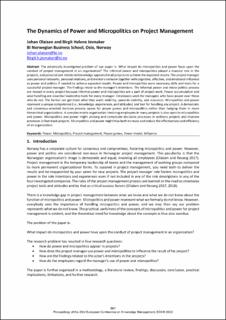The Dynamics of Power and Micropolitics on Project Management
Chapter
Published version
Permanent lenke
https://hdl.handle.net/11250/3115023Utgivelsesdato
2022Metadata
Vis full innførselSamlinger
Originalversjon
10.34190/eckm.23.2.353Sammendrag
The empirically investigated problem of our paper is: What impact do micropolitics and power have upon the conduct of project management in an organization? The informal power and micropolitics played a massive role in the projects, and personal and relational knowledge appeared in all projects to achieve the expected results. The project manager uses personal networks, personal relations, and mentor's network together with cognitive, affective, and emotional influence as power and politics if needed to achieve expected results. Power and micropolitics were necessary skills and tools for a successful project manager. The findings relate to the manager's intentions. The informal power and micropolitics process are reused in every project in the way that informal power and micropolitics are a part of project work. Power accumulation and wise handling are essential leadership tools for every manager. Employees work for managers who have power over those who do not. The former can get them what they want: visibility, upwards mobility, and resources. Micropolitics and power represent a unique competence (i.e., knowledge, experiences, and attitudes) and tool for handling any project. A democratic and consensus-oriented decision process opens for power games and micropolitics rather than hedging them in more hierarchical organizations. A complex matrix organization involving employees in many projects is also open to micropolitics and power. Micropolitics and power might prolong and complicate decisions processes in ordinary projects and improve processes in fast-track projects. Micropolitics and power might thus both increase and reduce the effectiveness and efficiency of an organization.
